April Marks End of Rijeka 2020 European Capital Of Culture Program
April 2, 2021 - The Rijeka 2020 European Capital Of Culture program ends this month.
Due to the coronavirus outbreak that started just a month after the official inauguration, the title of European Capital of Culture for Rijeka was extended until April 2021.
The Croatian National Tourist Board reports that over 50 cultural and artistic events will be held in Rijeka during April, the month that represents a kind of finale of the European Capital of Culture program, which the audience will be able to attend under controlled conditions and with respect for epidemiological measures.
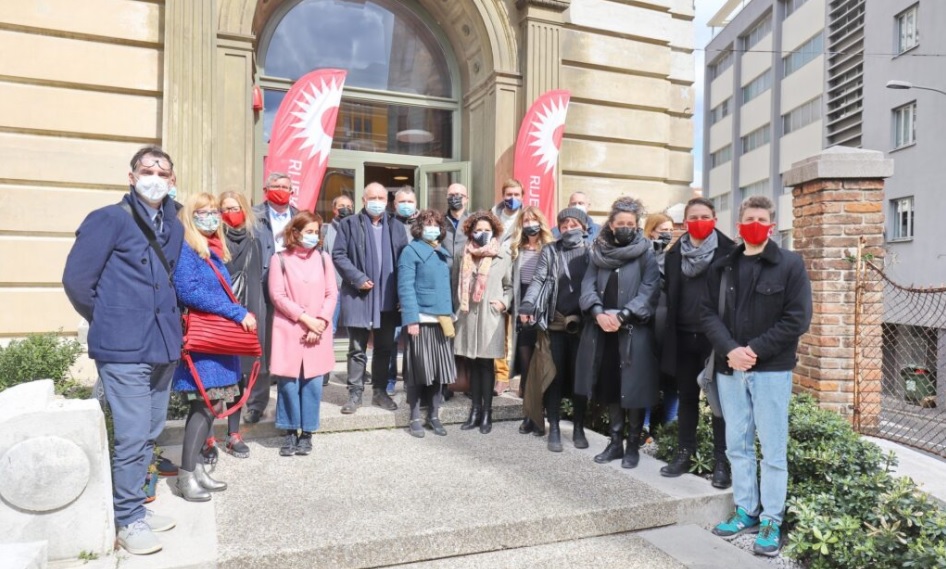
Credit: Rijeka2020.eu
Namely, for both the cities of Rijeka and Galway (Ireland), due to the outbreak of the COVID-19 pandemic and the inability to fully implement the originally planned program during 2020, the titles of European Capitals of Culture have been extended until the end of April 2021. Thus, the rich April program, which will officially mark the end of the European Capital of Culture project for 2020, will include plays, concerts, and programs in the theater. Themed guided walks around the city will be organized every weekend, as well as openings of permanent installations, exhibitions, programs in the newly opened Children's House, and similar events.
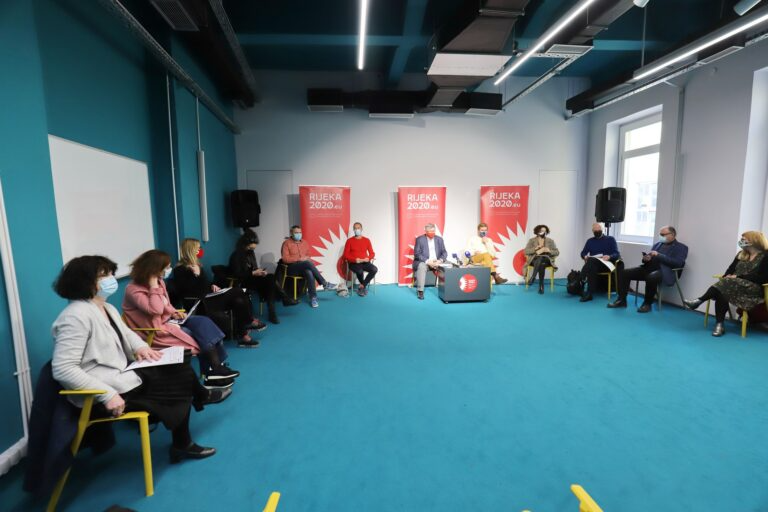
Credit: Rijeka2020.eu
Numerous events continue to take place after April, such as the exhibition ‘‘Unknown Klimt: Love, Death, Ecstasy’’, which brings Klimt's early works, paintings that were dismantled from the vault of the Ivan pl. Zajc Theatre in order to be restored and exclusively displayed in an exhibition in the newly renovated 18th-century palace, which was recently moved into by the Museum of the City of Rijeka, will remain open.
All events are organized in accordance with current epidemiological measures, but will also be adapted to any new measures and recommendations if necessary.
You can check and download the Rijeka European Capital of Culture Extended 2021 Programme here.
For more about travel in Croatia, follow TCN's dedicated page.
European Parliament Endorses Extending European Culture Capital Status
ZAGREB, Dec 18, 2020 - The European Parliament on Thursday endorsed a motion to extend the status of European Capital status for the period 2020-2023 which enables Rijeka to present all the programmes it had planned but was thwarted by the COVID-19 pandemic.
With 689 votes in favour MEPs adopted a report by Croatian MEP Zeljana Zovko (HDZ/EPP) to extend the status of European Capitals of Culture in the 2020-2023 period, which gives Rijeka and the Irish city of Galway the "green light" until April 2021 to present their programmes while the next capitals will be deferred from 2021 to 2022 and from 2022 to 2023.
Rijeka and Galway were the European Capitals of Culture for 2020 however the COVID-19 pandemic thwarted them from presenting their planned projects.
After the motion was upheld at a plenary of the parliament in Brussels the Council is expected to confirm the decision next week so that it can take effect before the end of the year.
Ahead of the plenary meeting, Zovko underlined that extending Rijeka's status "in this turbulent time of the pandemic, Rijeka will have another significant opportunity to show that the culture sector has adapted to new circumstances and that creative power during the corona crisis can show what is most important in the creative industry and cultural heritage in promoting European values."
PHOTOS: Huge New Street Art by Zagreb's Lunar in Rijeka and Dobrinj
December 2, 2020 – Streets have been noticeably quieter over recent days, although not by one building in Rijeka and a roadside in Dobrinj, Krk island, where renowned street artist, Zagreb's Lunar, has left two huge new murals
The cafes are closed but, what's more, there's a chill in the air. It's not only the lockdown that has made the streets of Croatia more quiet than usual at this time of year. Over recent days, temperatures have dropped to around zero when the sun falls. And it falls early. The light can be gone by 5pm.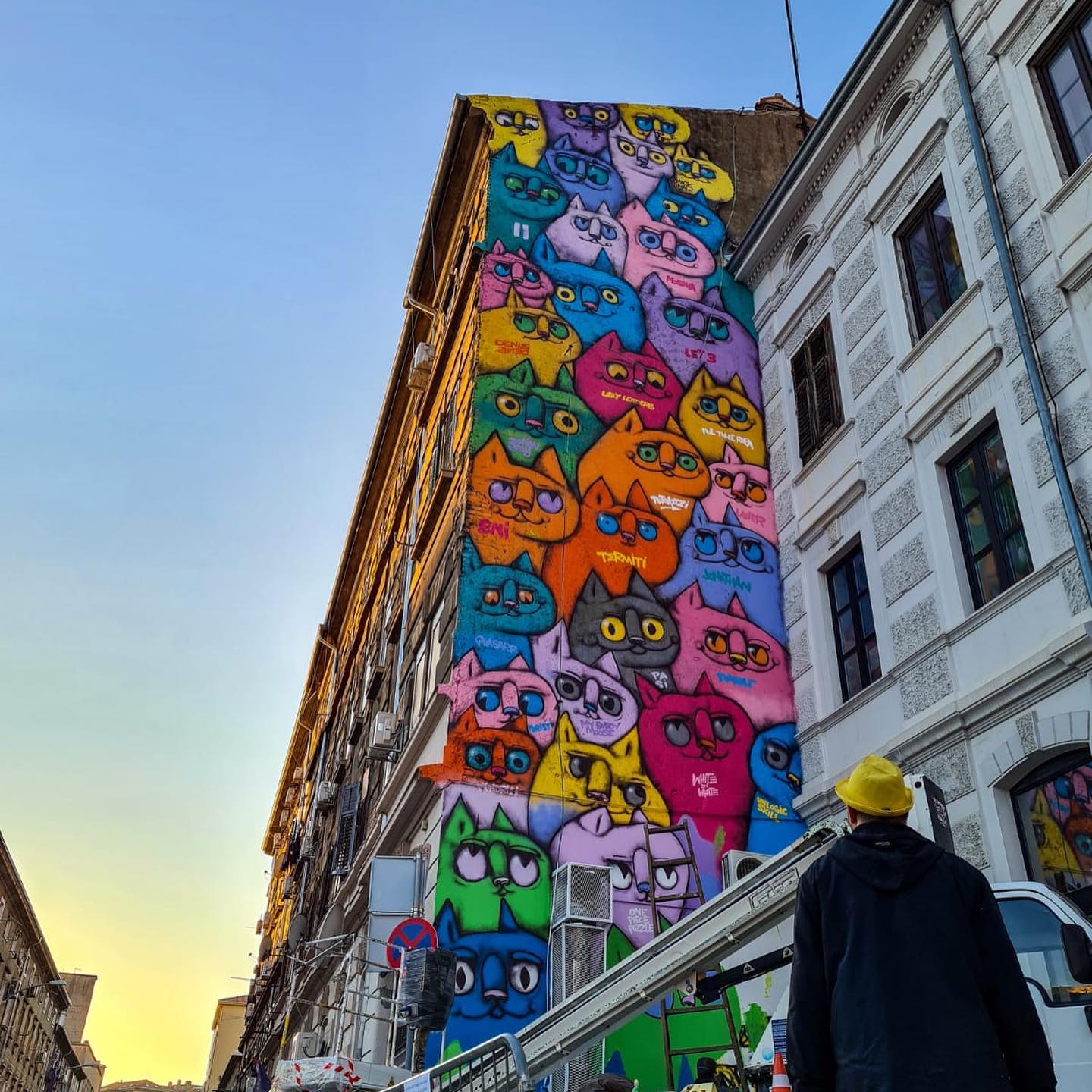 Rijeka
Rijeka
Exercise or a simple pleasant stroll around the Christmas lights have been all that's been drawing folks out onto the streets after dark, save for the food delivery guys whose bikes whizz past you faster than ever in the chill. Even during the day, the streets of Croatia are quieter than normal because of the lockdown.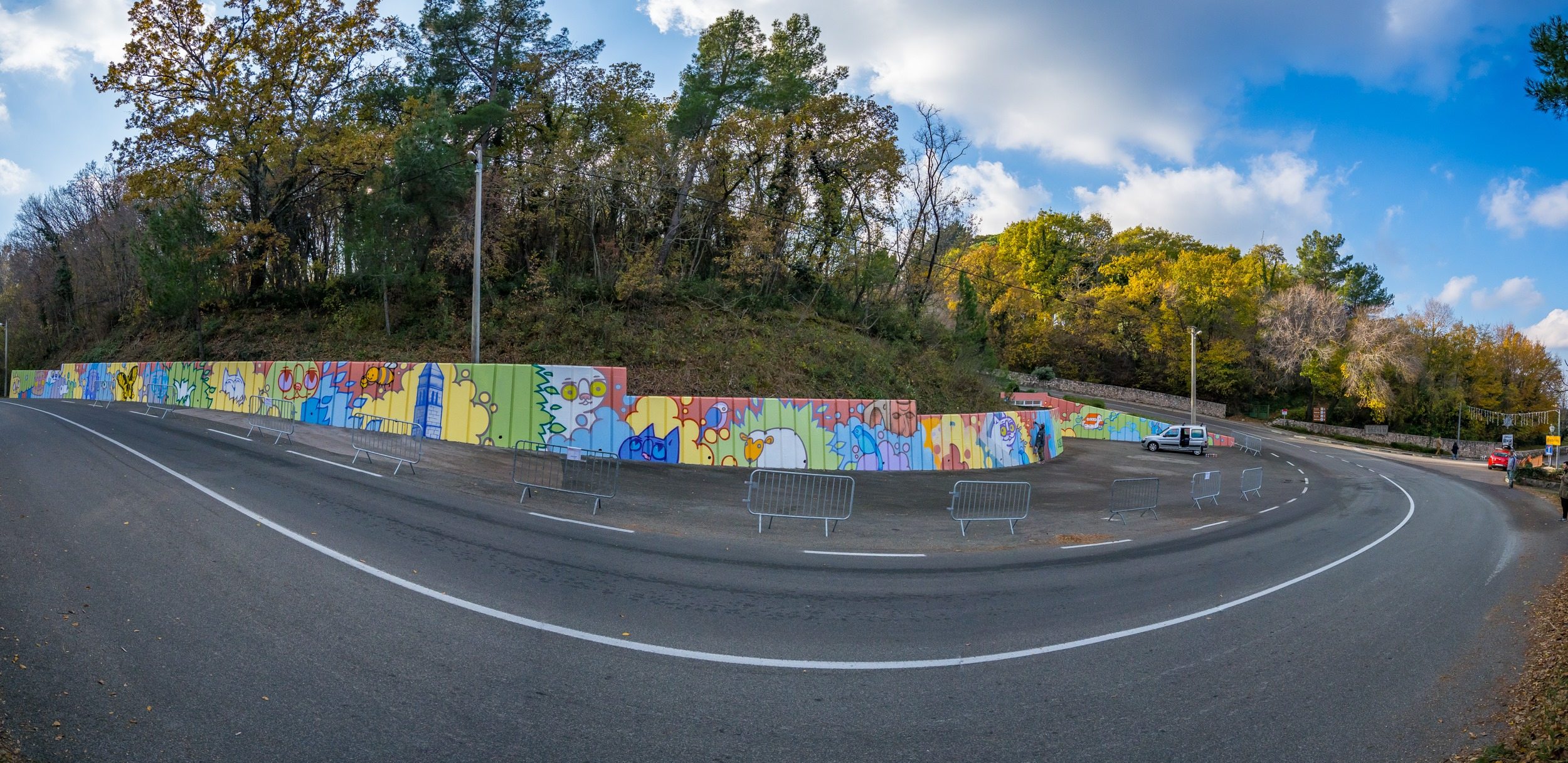
Dobrinj
But, these days haven't been anything other than normal for acclaimed artist Slaven Kosanovic aka Zagreb's Lunar. The cooler temperatures have only meant wearing more clothes and the quieter streets have not made his careful craftsmanship any quicker. His sometimes vast murals often require him to be above pedestrians passing below, up a ladder or even on a crane.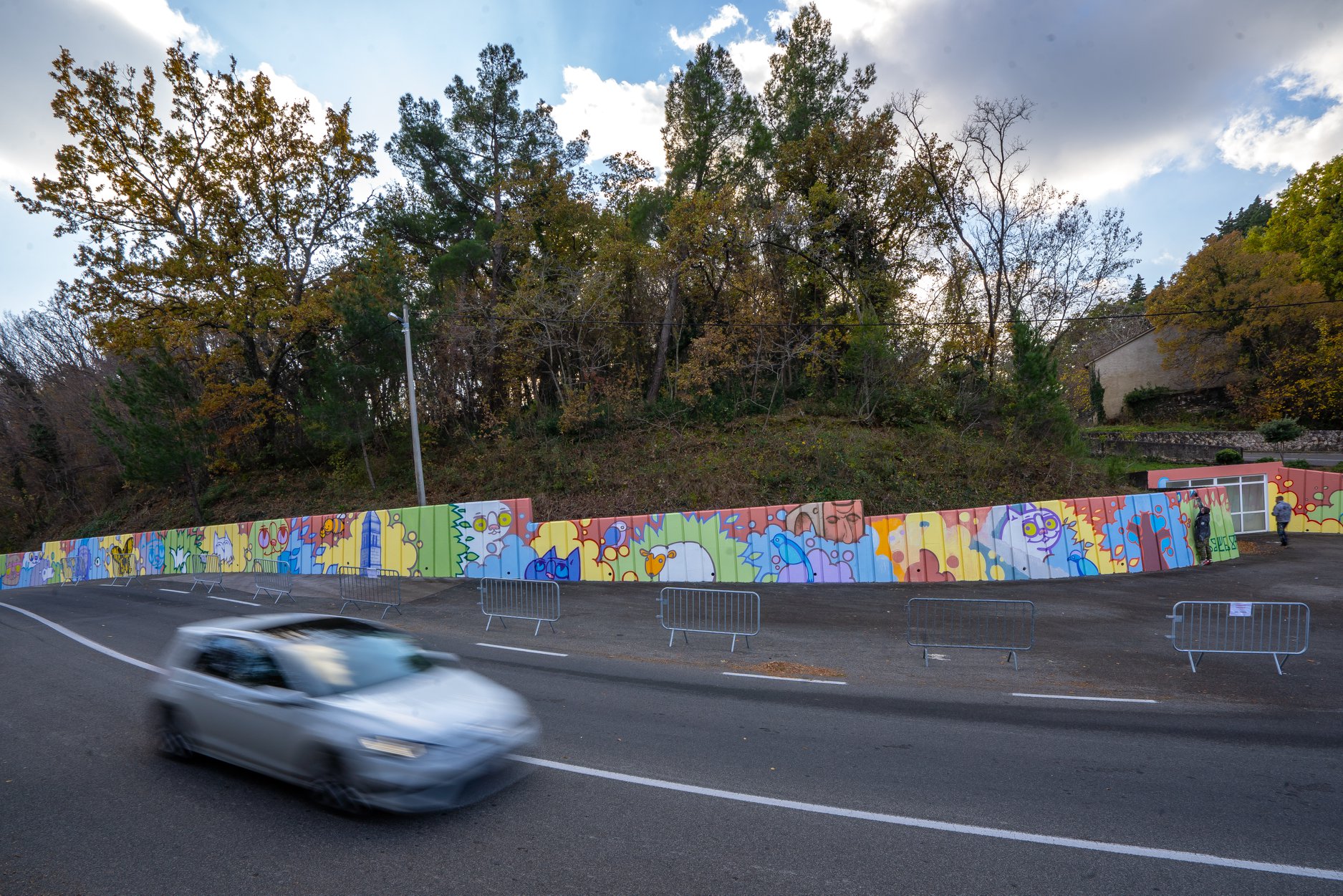 Dobrinj
Dobrinj
The two new paintings of Zagreb's Lunar definitely fall at the larger end of the works he has produced over the last 25+ years. One towers above street level on an entire building facade in Rijeka. So tall is the painting that trying to take it all in could strain your neck in the wrong wind. The other piece, in Dobrinj, Krk island, is just as epic, although this vast canvas lies horizontal, by the roadside.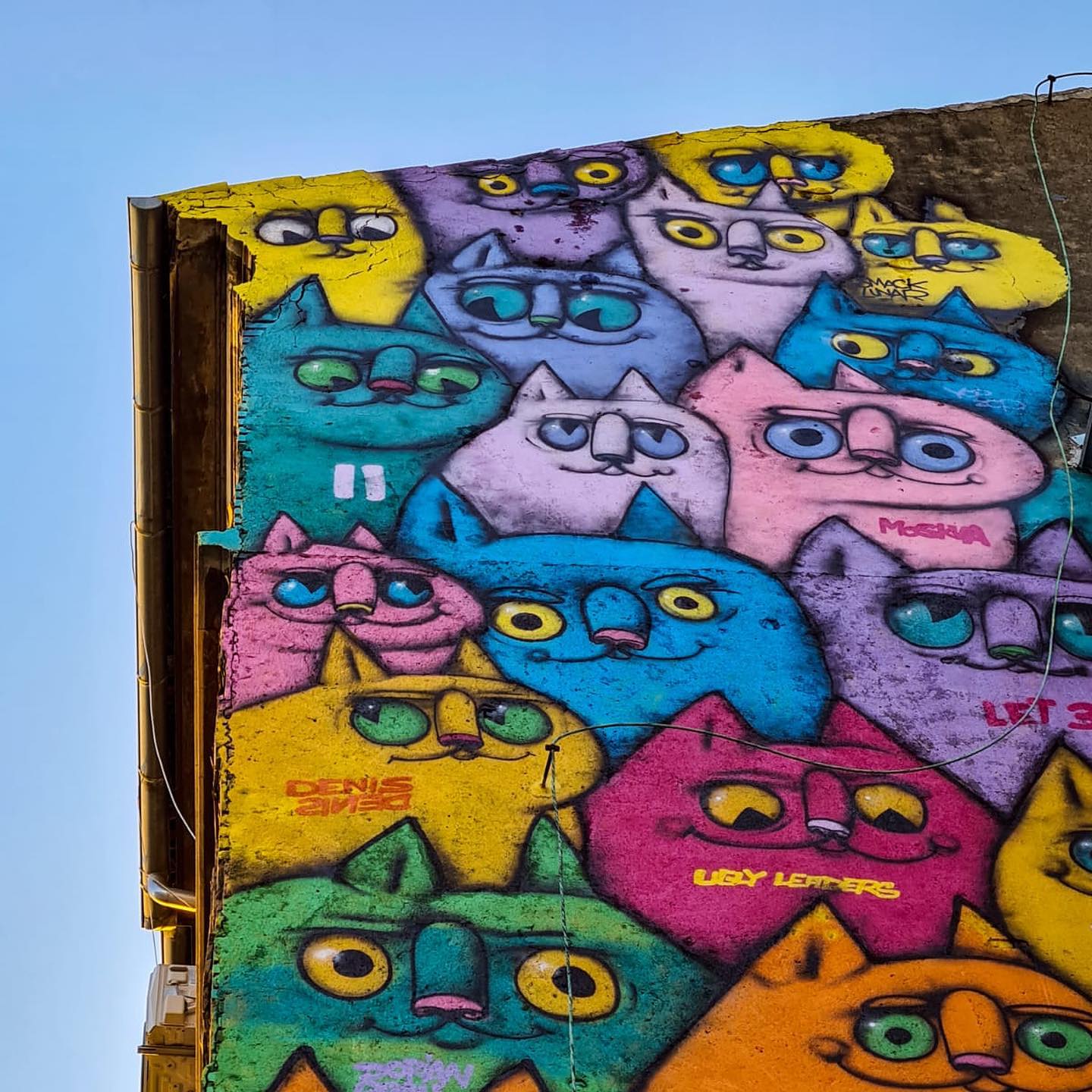 The Rijeka mural is dedicated to the city's music scene - you can spot some of the names of famous Rijeka bands in the painting
The Rijeka mural is dedicated to the city's music scene - you can spot some of the names of famous Rijeka bands in the painting
The Rijeka mural of Zagreb's Lunar, which he painted alongside his brother, with whom he often collaborates, is a four-story wall of cats dedicated to Rijeka's famous music scene. The mural took two days to complete. In the mural, you can spot the names of many Rijeka music groups like The Siids. Let 3, Denis & Denis and Jonathan. The mural is another part of the manifestations organised in celebration of Rijeka 2020 Capital of Culture.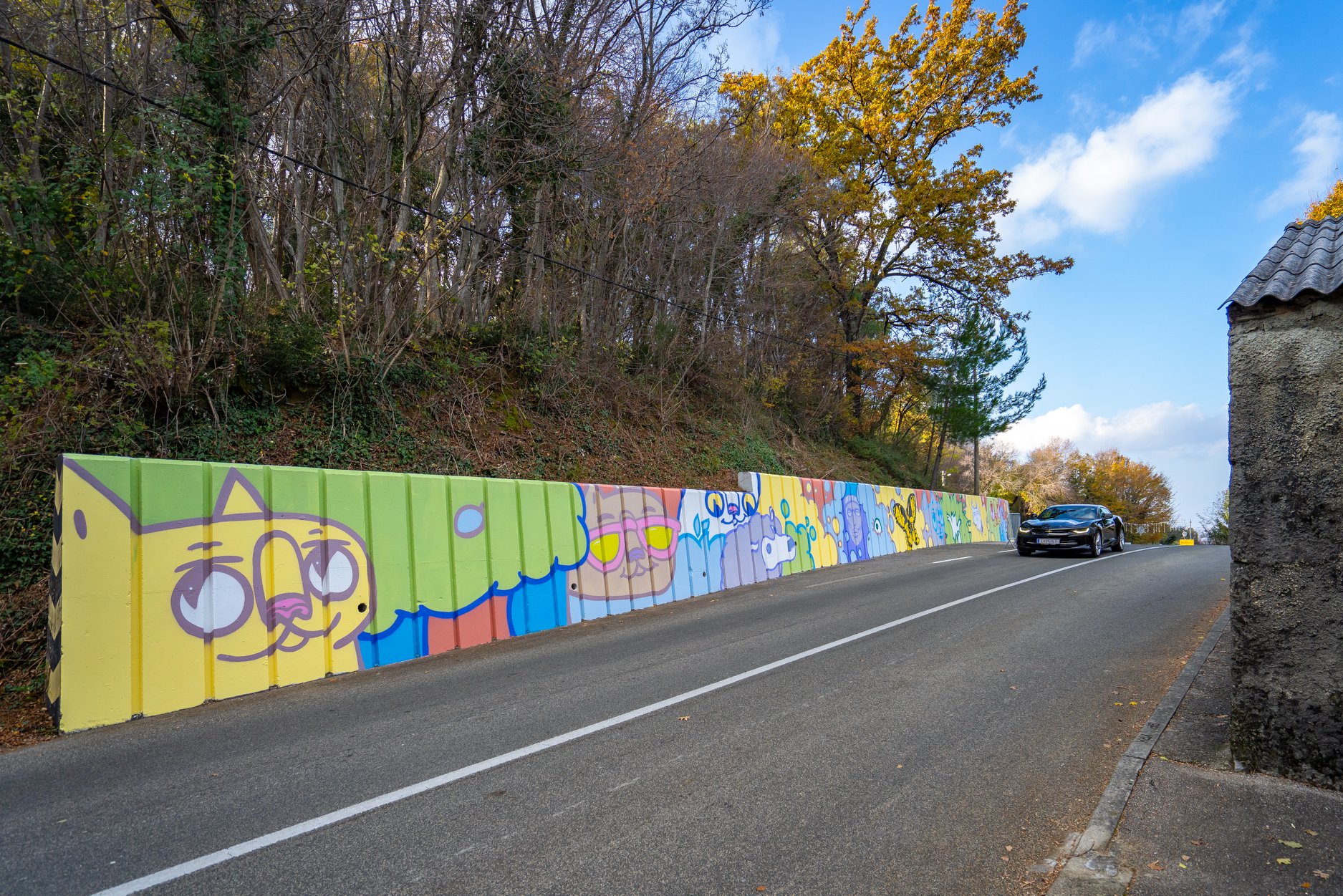 Dobrinj
Dobrinj
Krk island is a well-known tourist destination, but the pretty inland village of Dobrinj is far from the regular path of visitors. Anyone travelling past the enormous mural Zagreb's Lunar and his brother have left here will surely remember the name of Dobrinj. It may well entice some to come looking for it – it is by far the largest piece of public art on the island. It was facilitated by the community organisation Kulturni Dobrinj.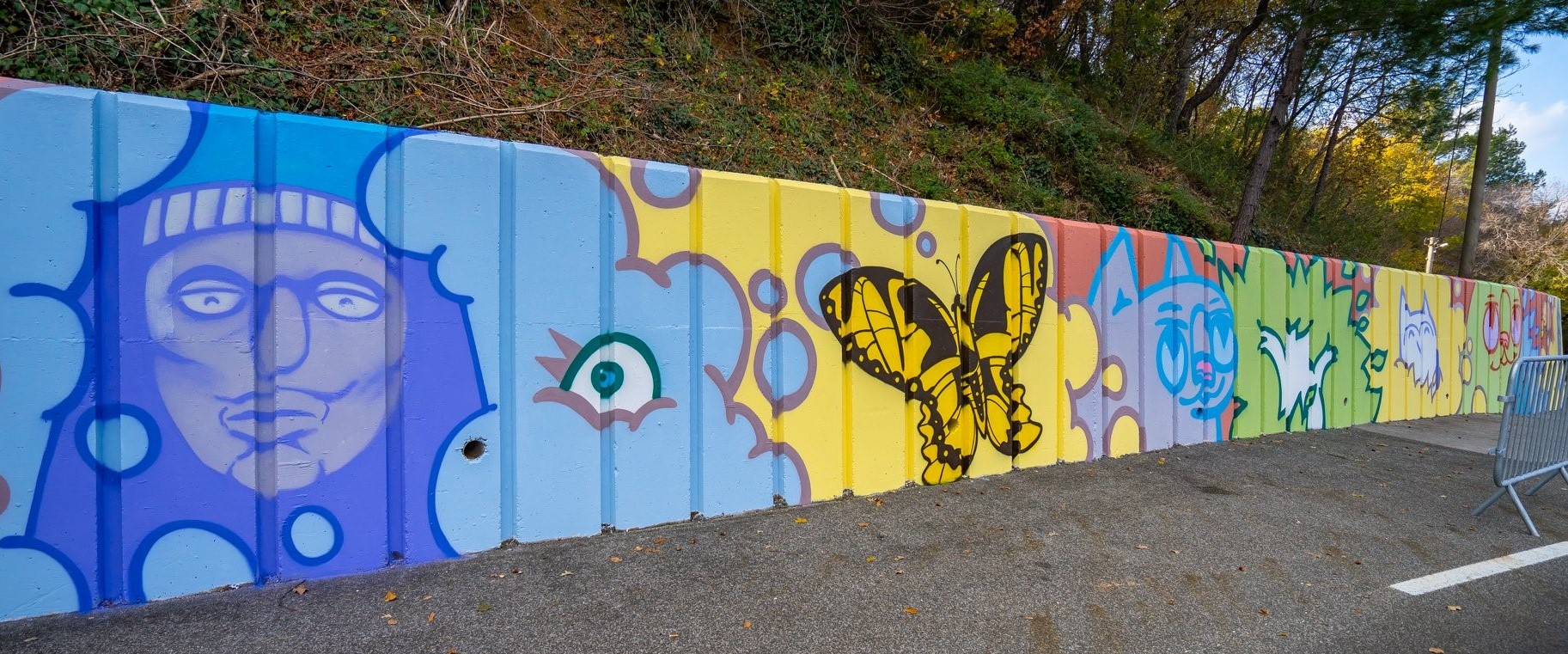 Dobrinj
Dobrinj
All photos © Antonija Diklic (Rijeka) Damir Jevtic (Dobrinj)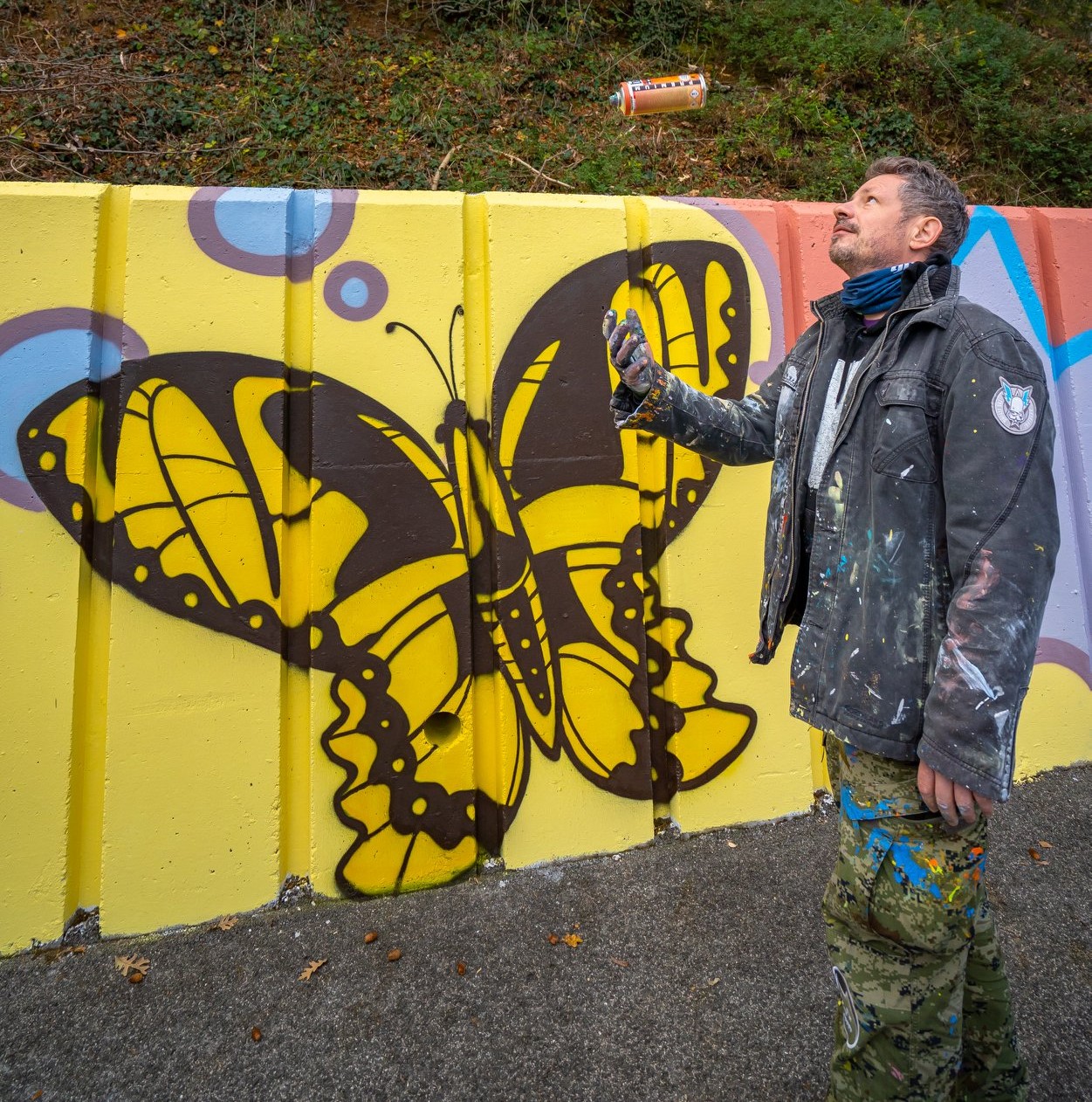 Dobrinj, with the artist, Slaven Kosanovic aka Zagreb's Lunar, on the right
Dobrinj, with the artist, Slaven Kosanovic aka Zagreb's Lunar, on the right
Giant Red Star Art Installation Appears Over Rijeka Skyline
September 20, 2020 - The giant red star art installation was today placed on a skyscraper, marking the day the Anti-fascist State Council for the National Liberation of Croatia returned Rijeka to its rightful place, as a city of Croatia
A giant red star today appeared over the skyline in the coastal city of Rijeka. Made from shards of bright red glass, the art installation sparkled in the late summer sun as it peered over the edge of a prominent city centre building. The installation is titled Monument to Red Rijeka - a self-defense monument and is by artist Nemanja Cvijanović.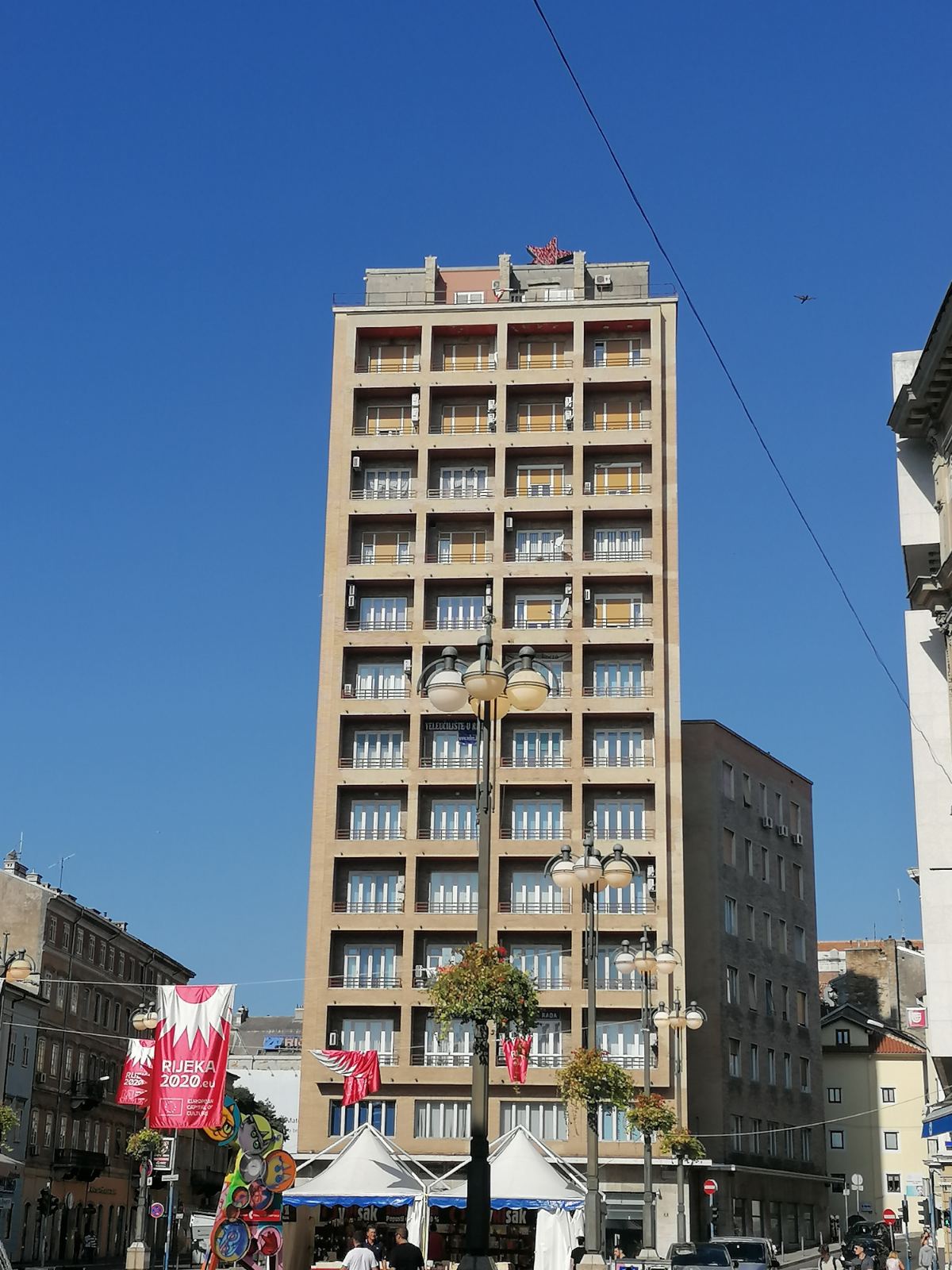
The red star was positioned on the very day that the Anti-fascist State Council for the National Liberation of Croatia returned Rijeka to its rightful place, as a city of Croatia. Rijeka, along with a huge amount of Croatian territory including Dalmatia and Istria had previously been ceded to Italy during World War II by the Independent State of Croatia (NDH).
The NDH was a puppet state of Nazi Germany and fascist Italy and one of the most-lethal regimes of the 20th century. Between 1941 and 1945 they established 22 concentration camps within the paltry territory their fascist masters allowed them to keep. The regime targeted Serbs, Jews and Roma as part of a large-scale campaign of genocide, as well as anti-fascist or dissident Croats and Muslims. Although concentration camps were originally invented by the British in Africa during the Second Boer War (1899 – 1902), the Second World War was the first time such camps were expressly built as death camps. The Independent State of Croatia (NDH) is the only state in the world to have ever had concentration camps just for children. They were located in Jastrebarsko and Sisak.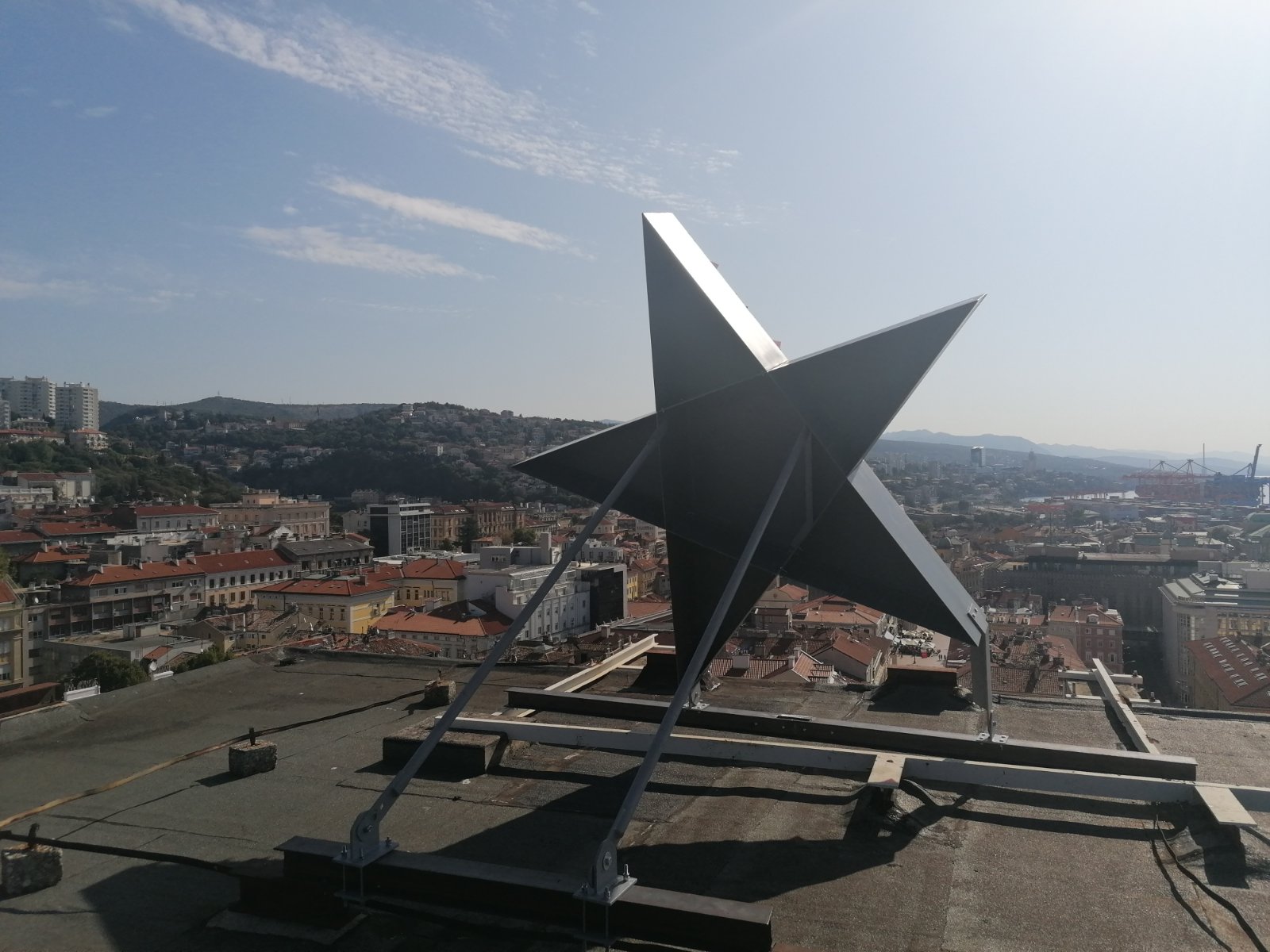
Rijeka's red star art installation is part of the city's programme for its designated year as European Capital of Culture. An essential element of Capital of Culture is the celebration of diversity. In Rijeka today, people of many different ethnicities and religions co-exist peacefully. Such a situation would never have been possible nor permitted under fascist rule.
The multi-ethnic and multi-cultural aspects of life in Rijeka today can be traced back to the day that the Anti-fascist State Council for the National Liberation of Croatia returned Rijeka to Croatia and subsequently created a state for all Croatians. It is therefore understandable that the city and its residents should wish to commemorate its liberation and return to Croatia in this way. The red star was the symbol on the flag of the Anti-fascist State Council for the National Liberation of Croatia.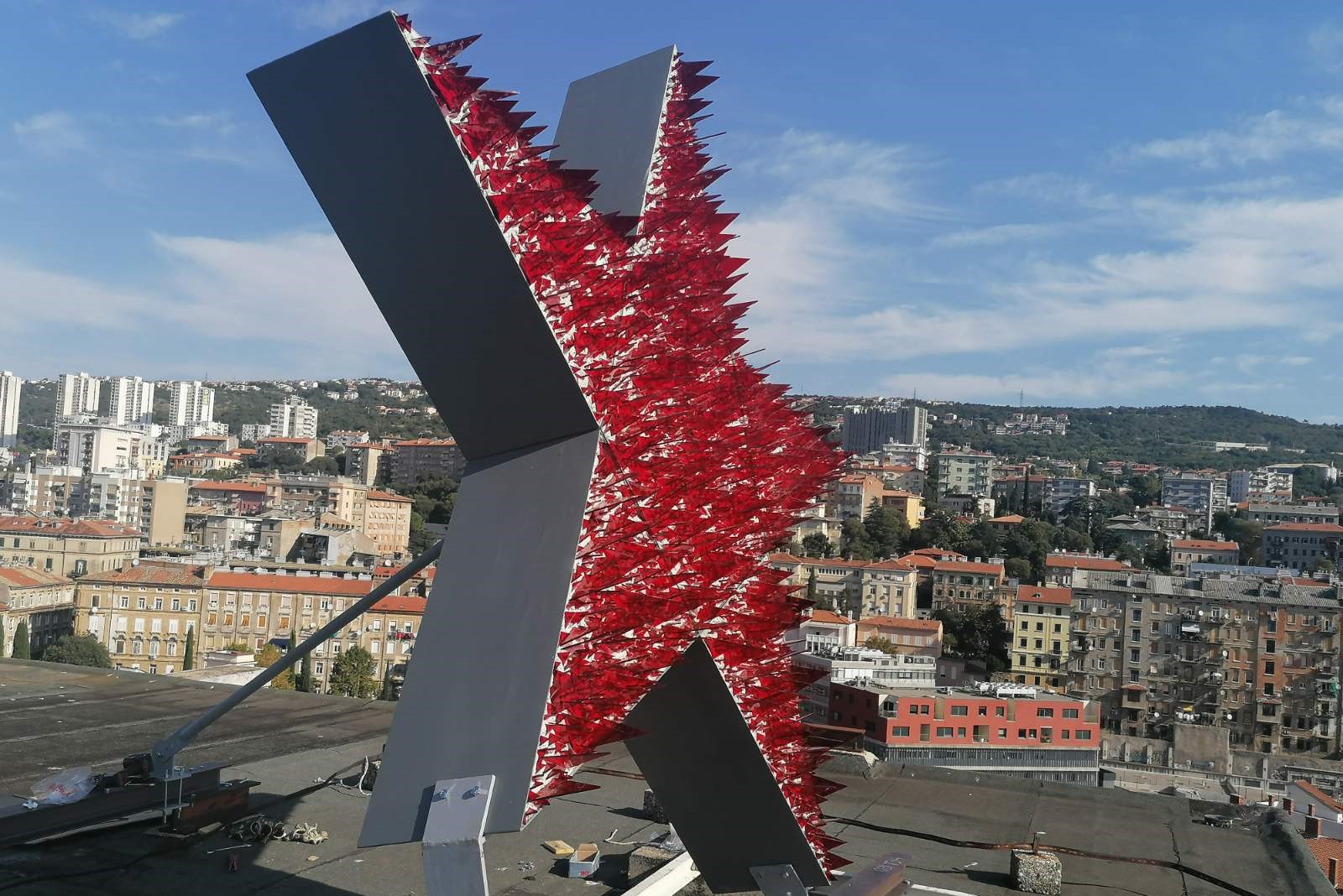
The red star symbol remains a controversial one amongst many Croatians as it is inextricably linked to communism. While the people of Rijeka have the right to commemorate their return to Croatia in any way they wish, some Croatians who don't live in Rijeka - or who don't even live in Croatia - are not happy when symbols of communism are used to celebrate liberation from fascism. Perhaps it should be for the people of Rijeka to decide how they wish to mark such a day and those who live in other territories can stick to deciding how their own local manifestations should look?
One group of angry men took to the streets of Rijeka in protest during the same afternoon the star was positioned. Some of them were seen to carry fascist Croatian flags which bore the symbol used by the NDH. Like the swastika and other Nazi symbols, this fascist flag is outlawed in many places such as Austria and Germany.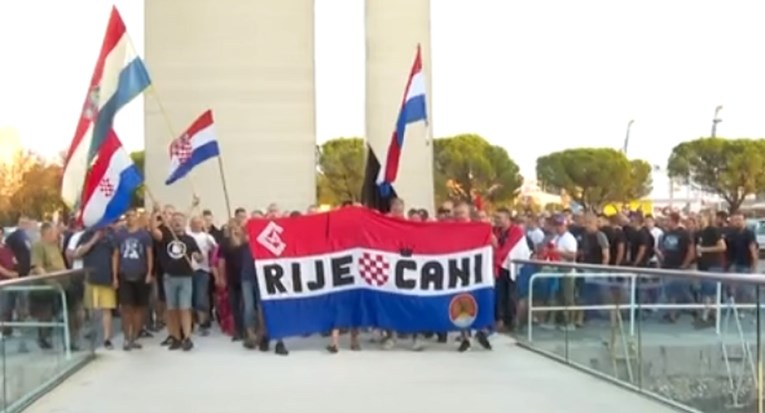
All photos © Rijeka 2020 (except screenshot from RTL television)
For the latest travel info, bookmark our main travel info article, which is updated daily.
Read the Croatian Travel Update in your language - now available in 24 languages
18th Liburnia Film Festival Begins In Opatija
August 23, 2020 – 21 films are in competition at Liburnia Film Festival, the country's leading festival promoting Croatian documentaries.
Liburnia Film Festival (LFF) returns this week to showcase the very best in Croatian documentary films. Held in the beautiful surroundings of Opatija, this is the 18th annual occurrence for Croatia's original documentary festival.
Opatija's small Summer Stage will host the festival's main competition programme, with an off-programme taking place at Villa Antonio in Opatija you will find. 21 films are this year competing for jury and audience awards, of which 9 are receiving their premieres at Liburnia Film Festival.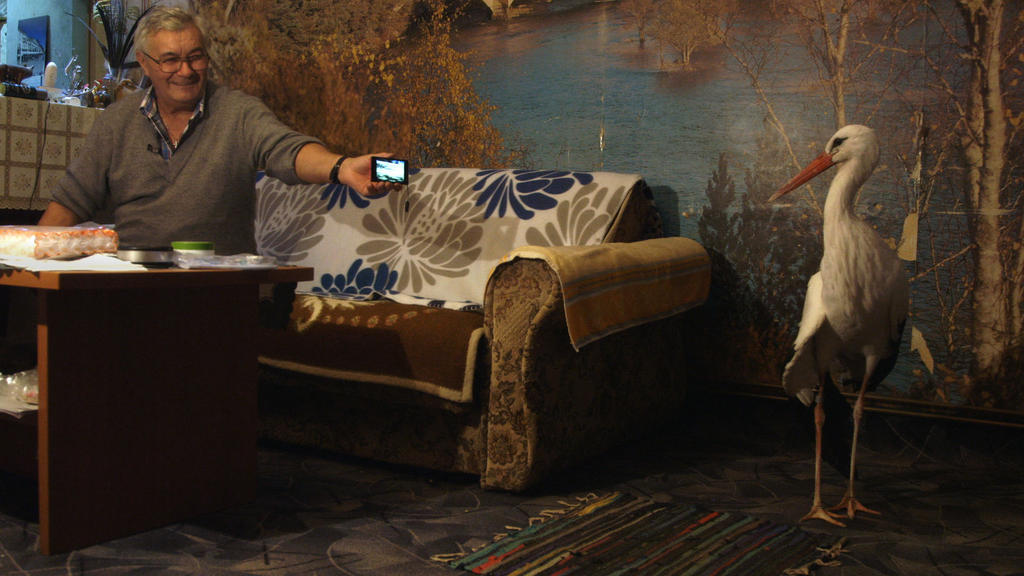
A scene from 2020 feature-length documentary 'Storkman' by Tomislav Jelinčić. The film follows Slavonski Brod widower Stjepan Vokić and his two famous, adopted house guests, the storks Malena and Klepetan. The film opens outdoor screenings on Monday 24 August at 20.15 © Transmedia Production
This year's international film programme is titled 'State of Emergency' and features 7 movies which focus on extremist movements in Europe. Part of this year's Liburnia Film Festival schedule is being run in conjunction with Rijeka Capital of Culture 2020.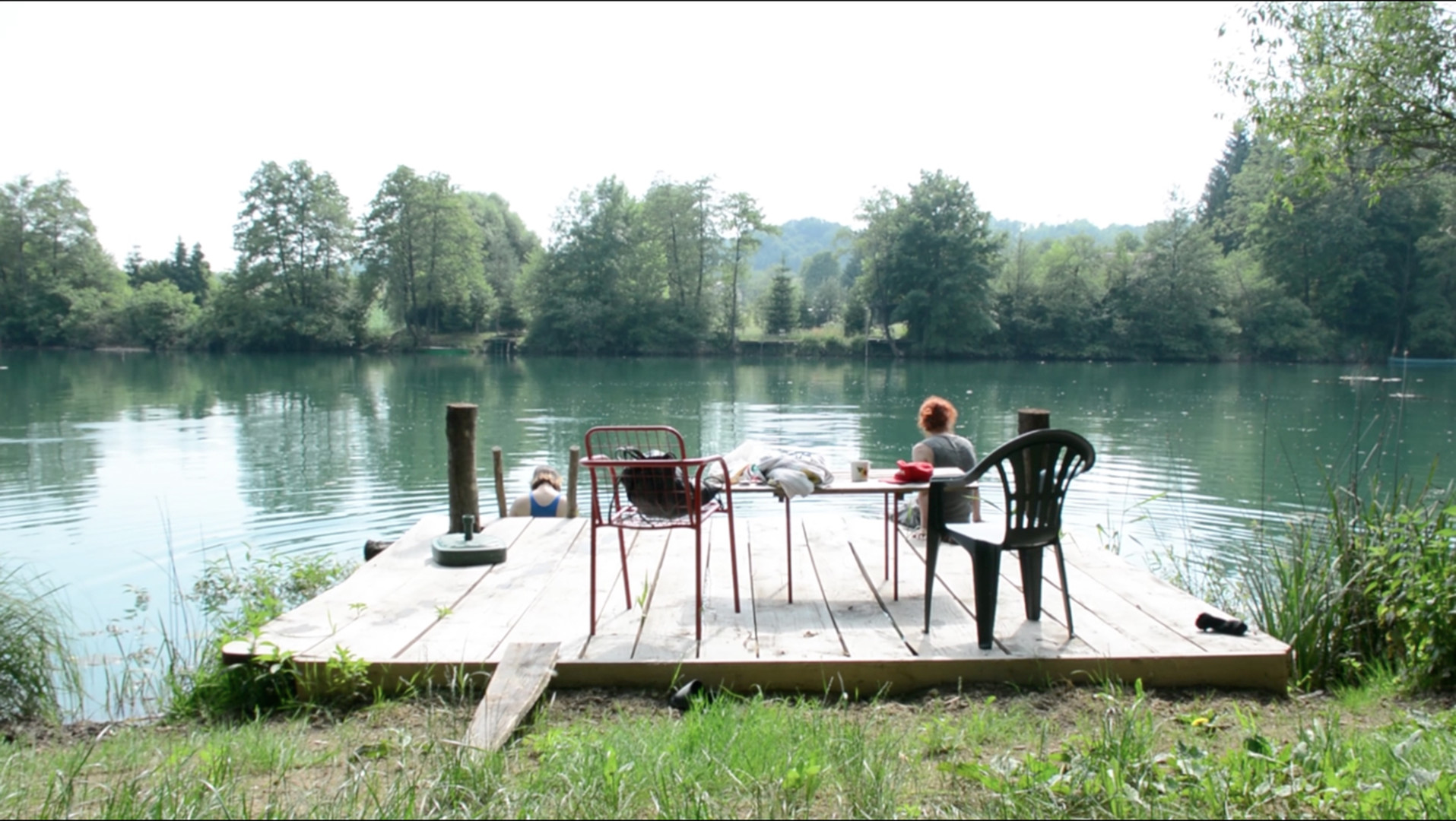
A scene from 2020 film 'My Universe' by Zagreb-based filmmaker Yuliya Molina. Russian immigrant mother Galja and her feminist street artist daughter Nastja appear to be worlds apart, but actually have more in common than they'd like to admit. The 28-minute movie won Best Slovenian Film at the recent FEKK Film Festival in Ljubljana and will be screened outdoors, after 22.30, on Monday 24 August © Akademija dramske umjetnosti Zagreb
Educational programmes and discussions with filmmakers in competition make up the afternoon sections of the festival. Screenings begin at around 18.00 each day at Villa Antonio for the off-programme, with outdoor screenings usually beginning at 20.15. The festival is adhering to epidemiological guidelines and as a result, there are a more limited number of seats than in previous years.
The Liburnia Film Festival begins on the evening of Monday 24 August and ends late on the night of Friday 28 August.
Lungomare Art: Rijeka 2020 Opens Balthazargrad Baths on Grcevo Beach
The Balthazargrad Baths open on July the 18th as part of the Rijeka 2020 programme which was greatly enfeebled by the coronavirus pandemic on the popular Grčevo (Šestica, Pajol) beach in Pećine.
As Morski writes on the 17th of July, 2020, this is one of ten installations that are being opened in various places along the coast in Primorje-Gorski Kotar County as part of the Lungomare Art programme, under the supervision of curator Michal Kolecek. The Balthazargrad Baths will open in cooperation with the Children's House programme, and the opening is an integral part of the Toboggan Children's Festival, which is currently underway.
Students of the Academy of Applied Arts in Rijeka, Antonela Brenko, Klara Dujmović, Katarina Kožul and Gea Rajić, under the mentorship of artist and professor Igor Eškinja, designed and created works of art that will adorn the area of Grčevo beach, all within the spatial practice course established precisely for this opportunity and funded through the Rijeka 2020 European Capital of Culture project.
The young artists were inspired by the theme of Professor Balthazar, and as such, their works invite both interaction and play. Grčevo beach, which is known for being not only a popular place for swimming, but is also used as a gathering place, a forum for discussions and cultural events, is now becoming the official city beach of ''Balthazargrad''.
The opening programme includes a musical performance by Marin Alvir from the band "Marinada" and the Kastav painter Saša Jantolek, the authors of the "Barbajol" picture book, which will be presented on the beach with a concert and illustrations.
The band "Marinada" will perform songs from the picture book itself, so the audience will be able to hear how their vision of children's music sounds in reality.
The protocol part of the opening of the swimming pool will follow at 19:30, followed by a concert by the aforementioned band at 20:30, which will present a repertoire of songs from the band's career, which has lasted for seventeen years and is adorned with musical experimentation.
The Academy of Applied Arts in Rijeka is the main partner of Rijeka 2020 in the Balthazargrad Baths project.
For more, follow our lifestyle page.
Review of Rijeka - European Capital of Culture 2020 After Project Ends, Says Minister
ZAGREB, May 28, 2020 - Minister of Culture Nina Obuljen Korzinek could not comment on Thursday on criminal charges related to alleged wrongdoing in the Rijeka - European Capital of Culture 2020 project, warning that the project was under the exclusive jurisdiction of the Rijeka city authorities.
"The rules are such that (the City of) Rijeka has absolutely autonomously created the programme. We in no way supervise or review costs," the minister told reporters when asked about the criminal charges filed against six members of a Rijeka-based company for favouring a bidder during public procurement procedures for the Rijeka - European Capital of Culture 2020 project.
"The government committed to securing certain funds at a defined pace and that project has its own model of supervision, spending and review which is European and independent," Obuljen Korzinek explained. The City of Rijeka is absolutely autonomous in creating and implementing the project programmes and the process is such that a complete review of the project will be conducted after it is completed, she added.
"Then we too will get the findings of those reviews. As far as I understand, this was launched in accordance with Croatian legislation and the people who advertised the tender and made the decisions should be asked about that. We did not participate in it," said Obuljen Korzinek. She added that the ministry had retained in its budget HRK 10 million that had been envisaged for the Rijeka project.
European Capital of Culture: Public Panel Held on Fate of Rijeka 2020
April 25, 2020 - The public panel 'European Capital of Culture - what to do?' was held regarding the Rijeka 2020 program. The discussion took place on April 24 via online chat service Zoom.
T.portal reports that the discussion was organized by Sanja Bojanic, Natasa Antulov and Marin Lukanovic from the Academy of Applied Arts, University of Rijeka, with speakers including Emina Visnic, director of Rijeka 2020 and Rijeka Mayor Vojko Obersnel, who spoke about the coronavirus impact on the European Capital of Culture, but also on culture in general.
The panel started with a statement by moderator Natasa Anutnov that a temporary suspension of the program was announced on April 17, and that 59 employees of Rijeka 2020 were laid off, while it was announced that the program was being restructured. She also confirmed that they had contacted the Ministry of Culture about participating in the panel, but no one had replied.
She asked Rijeka 2020 director Emina Visnic about what has been happening in her organization over the past month.
“First of all, I want to send a clear message: the ECOC as a project has not stopped nor has any of us who run the project said anything otherwise. Why speculations saying the opposite came up and why obituaries were written is another question, and I am personally interested in finding that conclusion,” said Visnic, who presented a calendar of activities undertaken since the crisis began. The ECOC, she noted, is much broader than Rijeka 2020 and touches many program partners.
Following the announcement of the program postponement on March 12 because of the decision by the National Civil Protection Headquarters, a discussion was held with partners leading larger segments of the program. The ban was estimated to last longer than previously announced, but at the time, they still hoped that work could begin by June. At the time, everyone thought that the virus would pass, but only now its impact is fully seen, and Visnic believes that life would not just return to normal.
'We had been planning this program for two years, and then in just one month, we had to change the framework urgently. The final program cannot be discussed now. Everyone asks, 'How much to cut, how much money?' And today we do not have an answer to that question because the Ministry of Culture should answer our inquiries next week," said Visnic, adding that most programs are in principle a public gathering, which will not be possible until June - and maybe later.
She further outlined all the activities they had undertaken in Rijeka 2020, all the conversations they had, and the suggestions they made towards the founders of Rijeka 2020, like hibernating the company and terminating activities or reducing workload, which was accompanied by reducing the number of employees. In the second variant, because canceling the project was rejected, the procedure was offered in two phases: the first, which they passed and which meant the said cancellations, and the second, to resume at the latest in June and July, which offers two variants, one with more and one with fewer programs.
The document was sent to the Ministry of Culture and Primorje-Gorski Kotar County, and it is not a final but a starting document, said Višnić, who also commented on the criticism that Rijeka 2020 has been invisible in recent weeks. The truth is, she confessed, that they had not communicated for two weeks, which she said she would take responsibility for if necessary. She added that the final version of the program proposal was made without a partner, which was mentioned as one of the main issues.
Mayor Vojko Obersnel estimated that thirty million kuna would be needed for the "new" ECOC, but that no one knows how much will eventually be provided to continue the project.
Along with him were Snježana Prijić-Samaržija, Rector of the University of Rijeka, Davor Mišković, Head of the Drugo More Association, Program Operator Dopolavoro, and Damir Čargonja, representative of Novi turizam d.o.o. and organizer of the Privremene Autonomne Zone program.
The talk, broadcast by Radio Roza, was also attended by numerous cultural figures and other interlocutors, from Vitomira Loncar, Aljosa Puzar, Ksenija Zec, Goran Sergei Pristas, Marcello Mars, Zvonimir Peranic and Daniela Urem to Irena Kregar Šegota, and formally linked to by the ECOC project.
The rector of the University of Rijeka, Snjezana Prijic-Samarzija, said that at this moment we must 'be hyper-ambitious'.
“We must not show the slightest weakness here. We should use all our strength because this is symbolic, Rijeka must not give up! We will all be guilty and responsible if we fail to return the ECOC to the fullest extent possible now,” she said.
Davor Miskovic of Drugo More, in charge of implementing the Dopolavoro program direction, presented his view of the current situation with a concrete example, but also considered the situation from a broader perspective and artists in Croatia and abroad.
“We did some projects for two years, the artists worked on them, researched, produced... We just needed to finish them. In some ways, together with our partners, we have said that we will realize them anyway. In any format - they will happen. The problem is with big spectacles involving a lot of people, as this is still unknown, it depends on the mode of our future lifestyle. The problem is also with the artists who had to come from, say, America or Canada, as that fell through, and Dopolavoro narrowed down significantly,” Miskovic said, describing the current situation as a gigantic crisis in culture.
Marcell Mars, one of the researchers at the Center for Postdigital Cultures at Coventry University, who worked with his colleagues on the 'Piratska skrb' project for Rijeka 2020, agreed. Mars sees solidarity as the only path to a concrete solution.
“Solidarity is the key. It is a question of survival and we need to put it as a key focus. We need to build a story that will have its basis in solidarity,” he said.
The situation was also addressed by Sergei Pristas, playwright and full professor at the Academy of Dramatic Arts, University of Zagreb, and co-founder and member of BADco., a performing arts collective.
“Rijeka is currently at a crucial historical moment, at the moment of redefining what culture is in the context of this moment. The focus should be on culture, not repertoire,” he said.
Ksenija Zec, choreographer and author of dance and drama plays and a professor at the Academy of Dramatic Arts in Zagreb where she teaches Stage Movement, gave her opinion on the topic of digitizing culture, which is increasingly mentioned in public because of the new situation, and explained that it is not so simple for numerous reasons.
“Digital art is not just a recording of a theater play," she said, adding: “Everything we do at the moment is a pledge for the future. The criteria should not be reduced, but the formats should be reduced.”
The sharpest criticism of all that was said in the official part, before the discussion, was addressed by Vitomir Loncar, who warned that there could be no gathering still in September or October.
“There are no suggestions for online activities in all your plans, which means you are not seeing the times we are living in. The presentations show that you act as if you have a decades-worth of time, the future, and the situation is long gone,” Loncar said, while Puzar and Čargonja referred in particular to layoffs for employees in Rijeka 2020.
“I was shocked by the dismissal of the workers, and I signed the letter. But I am also shocked by the letter, it is written as it is written, not too much is being asked for, but it is a disappointment to those people who lost their jobs and rebelled,” said Čargonja, adding that some who were listed as the signatories did not actually sign the letter. To the mayor's remark that most of them responded, "I don't know, but the generation has rebelled and wants to exercise their rights. That always had to be ahead of the rest.”
You can listen to the full panel discussion here.
To read more about lifestyle in Croatia, follow TCN's dedicated page.
European Capital of Culture: What Will Remain of the Rijeka 2020 Program?
April 15, 2020 - Rijeka's head of the Department of Culture, Ivan Sarar, discusses the impact of the coronavirus pandemic on the Rijeka 2020 program.
In these challenging coronavirus times, the cultural sector is strongly affected, but since it shares the fate of other sectors, it does not seem to enjoy much public discourse.
In this context, Rijeka is living a unique story. What was supposed to be a cultural feast in the year of the European Capital of Culture - when we expected to hold debates in ideological, sociological, ethical, artistic, critical-theoretical and other conversations - became the burial ground of culture where victims are collected.
Rijeka's head of the Department of Culture, Ivan Sarar, interviewed with Novi List to discuss the impact of the pandemic on the Rijeka 2020 program.
In an interview with Novi List, the Minister of Culture announced that the Ministry would not be able to pay the agreed financial support to the ECOC. What is the amount?
"It is still unknown how much the Ministry of Culture's financial support will be for the ECOC project."
In terms of the City of Rijeka's financial obligations to the ECOC, what, or how much, will be the issue?
"Over the past three weeks, the City of Rijeka, in response to the coronavirus pandemic, and in an effort to help outright disadvantaged private sector businesses, has taken a number of measures that directly affect the city budget cuts. Similarly, the measures were also adopted by the state, also with regard to reducing the liabilities of the economic sector, which also has a direct impact on filling the income tax budget. So there is only one thing in such uncertainty: there will not be as much funding for the ECOC program as originally planned. And it is impossible and ungrateful to give concrete figures at this time."
Rijeka 2020 announced the restructuring of the program. What are the requirements of the Rijeka Department of Culture in terms of deadlines? When does Rijeka 2020 have to come up with a new proposal and in what direction will it go, to your knowledge?
"The program, which began on 1 February 2020 and was to run until 31 January 2021, is planned, prepared and organized over four years. Now it needs to be redesigned, significantly reduced, revised to over 250 program activities that originally had to include more than 600 events in a very short time.
Basically, a significant reduction in the overall budget should have been foreseen, but through certain logical criteria that we discussed earlier. Rijeka 2020 completed this first revision this week with several possible scenarios.
I was personally involved in this review, the first proposal was also submitted to the City and will be sent to the Ministry of Culture. It is certainly not the final document, and it does not constitute a definitive list of the programs of the "new ECOC", but is the basis for further discussions between the City, Ministry, PGZ, Rijeka 2020 and the partners involved.
The biggest challenge we all face is not really the number of programs or funding, but the total uncertainty surrounding the pandemic, which cannot be influenced by anyone, and it directly concerns the number of programs and future available resources and the timeframe for implementing any programs withheld. I'm saying that it concerns the audience themselves on those programs. Because it is perhaps crude to predict when the situation will normalize, it is much harder to predict the extent to which people will regain old habits and what their behavior will be, but also the expectations of citizens."
Are the infrastructure investments of "Bencic", "Galeb", and "Exportdrvo" in question? Are the European funds for "Bencic" and "Galeb" in question?
"So far, infrastructure investments are not in question. They have their own dynamics of work and payments, they are financed with significant amounts of EU funds and there are no major problems in this part of the project. The Sugar Palace and the Children's House are already in an advanced stage of construction before all work is completed.
We are facing smaller mobility issues and smaller delays in the delivery of materials and parts that have been ordered from abroad, but it is likely that these facilities will not be open to the public before the termination of the measures of reduced social contacts, or before the real possibility of offering ongoing program activity."
How much has the City of Rijeka disbursed approved funds to the users of Public Needs in the Culture of the City of Rijeka for 2020?
"There were no payments for public needs this year."
What is the debt of the City of Rijeka regarding the public needs before 2020?
"The City of Rijeka's debt to the beneficiaries of the 2019 Public Needs Fund is HRK 315,000."
What policy will you take to maintain approved programs, which have all been delayed, and disbursing funds for approved programs?
"The budget for public cultural needs for 2020 is around HRK 3.5 million. Given the liquidity of the overall budget in the new circumstances, we will strive to maximize payments for all programs held so far, including debt for the previous year. With regard to approved programs, it is certain that due to a budget deficit, we will have to go for a reduction in funding. We are just finalizing the priority criteria by which we will reduce program resources. We intend to maintain stability within the cultural sector in such a way that priority will be given to associations that have employees, freelance artists and all those projects where the financial structure suggests the existence of existential well-being for actors in the urban cultural scene."
What are the budget estimates for next year's Department of Culture, given the new situation with the coronavirus crisis?
"It is impossible to predict the budget for 2021 at this time; we still do not have any input from which to know what the financial framework is. The only certain thing is that it will be very tight. But it's too early to say how much.
We are currently considering urgent measures to run the projects as normal in the current year, as well as considering several models for the survival of the ECOC as Croatia's largest cultural project."
What measures are you taking in the Department of Culture to protect self-employed artists, small businesses in the cultural and creative sectors, and the self-employed, whose livelihoods are already threatened?
"Measures have been adopted on a city-wide basis for all those who cannot work in these conditions. The mayor also announced the possibility of extending measures to monitor the situation. These measures now relate to deferrals and write-offs - rents, utility bills, monumental rents, surtaxes and more. I partly answered this question in my earlier answers, as well.
As far as the self-employed are concerned, the City of Rijeka has not foreseen direct financial assistance in any crisis measure so far. We are in intensive communication with the Ministry of Culture, which has opened several lines of measures to assist the self-employed so that we can eventually contribute to this segment. The problem in this is the considerable clutter in the records as well as the very difficult job of defining the criteria for assistance that should be determined on a case-by-case basis.
On the other hand, this topic is, to a considerable extent, actually emerging from the cultural policy domain and entering the social policy domain. But I repeat, we will certainly do our utmost to maintain the continuity of payments to all who fall into the domain and have described your matter through the payment of public cultural needs. We are working on the decision to introduce rent-free studios and cultural associations."
Will there be any changes in the staffing structure of the Department of Culture and will salaries will be reduced in both the Department and public cultural institutions that are under the jurisdiction of the City of Rijeka?
"As things stand now, given the real state of budget cuts caused by this situation, it is likely that salaries will be reduced at the level of the city government, both in the city administration and in budget users and in Rijeka 2020."
To read more about lifestyle in Croatia, follow TCN's dedicated page.
European Capital of Culture Title Brings Record Rijeka Tourism
Rijeka tourism is booming, and this often overlooked Croatian city, known for its industrial past and perhaps what's most interesting of all, the invention of the torpedo, is experiencing a great start to 2020.
Rijeka isn't always that high on the lists of foreign tourists keen to explore Croatia. With central and southern Dalmatian cities like Split and Dubrovnik always firmly placed, sometimes even Zagreb doesn't get a look in. Things appear to be changing, however, now that the city that flows in the Northern Adriatic area of the country has taken the European Capital of Culture Title for 2020.
As Novac writes on the 6th of March, 2020, in February 2020, Rijeka ranked impressively in third place in terms of tourist turnover earned in family accommodation units with 2,650 realised arrivals, and ranked eighth in total tourist turnover in the Republic of Croatia with 20,037 overnight stays achieved.
Novi list reported on the above announcement issued by the Rijeka Tourist Board, who also noted the first two months of 2020, Rijeka tourism was doing more than brilliantly as the city recorded an excellent tourist turnover of 37,943 overnight stays, which marks impressive growth of thirteen percent when compared to the same period in 2019.
The highest number of overnight stays in Rijeka was realised by Italian citizens, and then tourists from the USA, who realised 2,765 overnight stays, which is of significant interest. The average stay of foreign tourists in the period between the 1st of January 2020 to the 2nd of February 2020 is 3.48 days and the average stay of Croatian tourists is 2.21 days.
The excellent Rijeka tourism result is supported by the tourist turnover for February, which recorded 20,052 overnight stays, which is fourteen percent more than back in February 2019, long before Rijeka took the title of European Capital of Culture.
The rich programme of the Rijeka Carnival certainly also contributed heavily to the largest number of overnight stays recorded in February in the City of Rijeka.
Last month, the European Capital of Culture shined adorned its vibrant carnival colours and generated tourist turnover of 4,358 overnight stays, seventeen percent more than were realised back in 2019 during the Rijeka Carnival weekend, which ran from February the 21st to the 24th, 2020.
Guests and participants of the International Carnival Parade contributed to the increase of tourist traffic not only in Rijeka, but also in all nearby destinations in the Kvarner region.
According to data from the eVisitor information system, the largest number of overnight stays in February were spent in private accommodation, which accounts for 45.27 percent, followed by hotels, non-commercial accommodation and hostels.
Make sure to follow our dedicated travel page for more.


